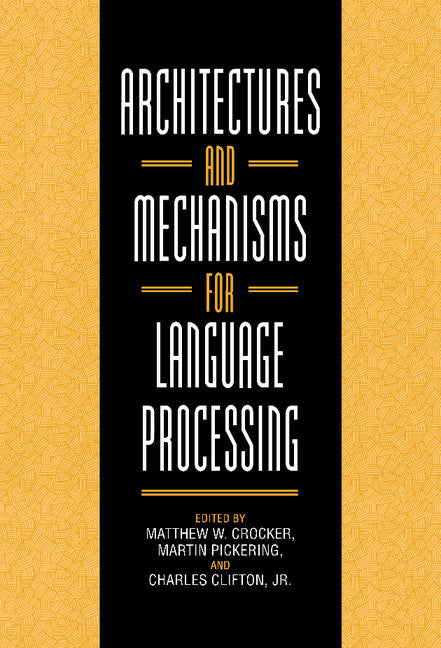Freshly Printed - allow 8 days lead
Couldn't load pickup availability
Architectures and Mechanisms for Language Processing
This book brings together linguistic, psychological and computational perspectives on cognitive mechanisms in sentence processing.
Matthew W. Crocker (Edited by), Martin Pickering (Edited by), Charles Clifton (Edited by)
9780521631211, Cambridge University Press
Hardback, published 28 November 1999
376 pages, 60 b/w illus. 13 tables
22.9 x 15.2 x 2.5 cm, 0.72 kg
"This book represents the state of the art in sentence processing, with interesting examples and opportunities for computational modeling." Computational Linguistics
The architectures and mechanisms underlying language processing form one important part of the general structure of cognition. This book, written by leading experts in the field, brings together linguistic, psychological and computational perspectives on some of the fundamental issues. Several general introductory chapters offer overviews on important psycholinguistic research frameworks and highlight both shared assumptions and controversial issues. Subsequent chapters explore syntactic and lexical mechanisms; statistical and connectionist models of language understanding; the crucial importance of linguistic representations in explaining behavioural phenomena; evidence from a variety of studies and methodologies concerning the interaction of syntax and semantics; and the implications for cognitive architecture. The book concludes with a set of contributions on select issues of interpretation, including quantification, focus and anaphora in language understanding. Architectures and Mechanisms for Language Processing will appeal to students and scholars alike as a comprehensive and timely survey of recent work in this interdisciplinary area.
Contributors
Preface
1. Architectures and mechanisms in sentence comprehension Martin J. Pickering, Charles Clifton, Jr., and Matthew W. Crocker
Part I. Frameworks: 2. Evaluating models of human sentence processing Charles Clifton, Jr
3. Specifying architectures for language processing: process, control, and memory in parsing and interpretation Richard L. Lewis
4. Modeling thematic and discourse context effects with a multiple constraints approach: implications for the architecture of the language comprehension system Michael K. Tanenhaus, Michael J. Spivey-Knowlton, and Joy E. Hanna
5. Late closure in context: some consequences for parsimony Gerry T. M. Altmann
Part II. Syntactic and Lexical Mechanisms: 6. The modular statistical hypothesis: exploring lexical category ambiguity Steffan Corley and Matthew W. Crocker
7. Lexical syntax and parsing architecture Paola Merlo and Suzanne Stevenson
8. Constituency, context, and connectionism in syntactic parsing James Henderson
Part III. Syntax and Semantics: 9. On the electrophysiology of language comprehension: implications for the human language system Colin Brown and Peter Hagoort
10. Parsing and incremental understanding during reading Martin J. Pickering and Matthew J. Traxler
11. Syntactic attachment and anaphor resolution: the two sides of relative clause attachment Barbara Hemforth, Lars Konieczny, and Christoph Scheepers
12. Cross-linguistic psycholinguistics Marica De Vincenzi
Part IV. Interpretation: 13. On interpretation: minimal 'lowering' Lyn Frazier
14. Focus effects associated with negative quantifiers Linda M. Moxey and Anthony J. Sanford
15. Constraints and mechanisms in theories of anaphor processing Amit Almor
Author index
Subject index.
Subject Areas: Computer science [UY], Psycholinguistics [CFD]


